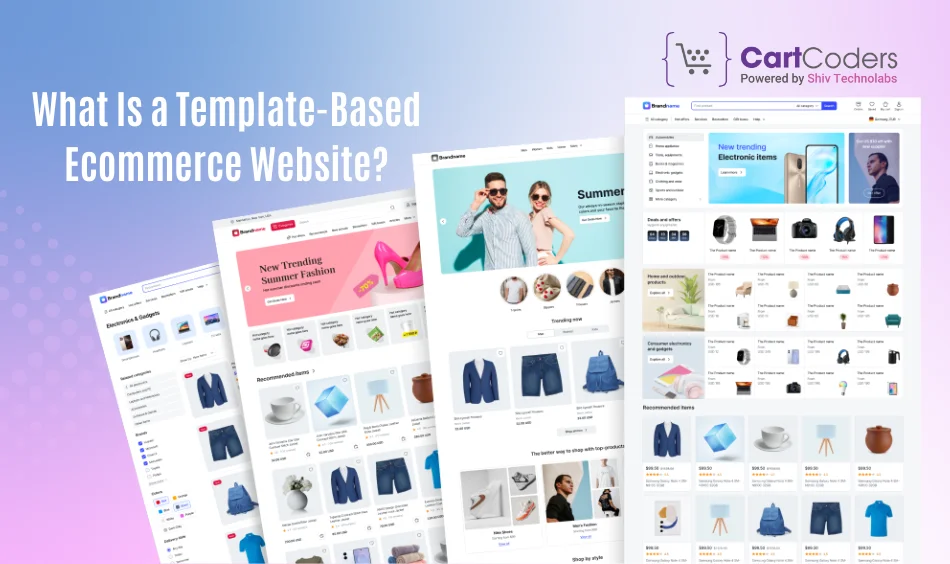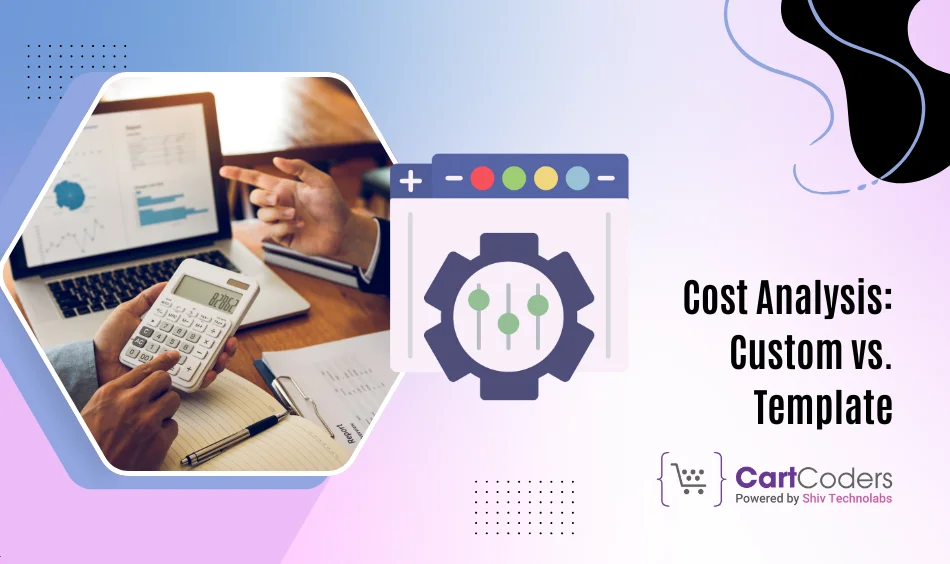Custom Engagement Solutions
Unlock tailored solutions with a free, no-obligation strategy session.
Expert Developers & Engineers on Demand
Scale Your Team with Skilled IT Professionals
Expert Guidance for Digital Transformation

One of the most important decisions with online businesses today is whether to go for custom ecommerce website or a template-based ecommerce website. Templates might be quick and cheap, but the solution may also be inflexible and unscalable.
The discussion of custom vs. template ecommerce website should not only look at your budget but it should also consider if you are aligning yourself with your long term business goals, your brand identity as well as customer experience expectations.
This guide discusses about custom ecommerce development cost, template ecommerce website cost, as well as provides platform-specific comparisons including custom ecommerce website vs. Shopify template, WordPress WooCommerce custom vs. theme-based ecommerce, BigCommerce custom website vs. template, and headless custom ecommerce vs. template website scenarios.
A custom ecommerce website is customized according to specific business requirements. Unlike off-the-shelf solutions, the user interface or design, including backend functionality and integrations is tailored to your needs.
Key Advantages:
Custom ecommerce websites are Ideal for big businesses, quickly scaling businesses and companies which require specialized B2B or subscription-based functionalities.

A template-based ecommerce website is the one in which you get the look and feel with pre-designed themes available on platforms such as Shopify, WooCommerce and BigCommerce. By getting to know what determines the template ecommerce website cost, it is easy to see why startups and small businesses are usually the ones starting with templates when they venture into ecommerce.
Primary Advantages:
Notable Limitations:
Understanding the custom vs. template ecommerce website comparison requires examining multiple factors:
| Factor | Custom Ecommerce Website | Template-Based Ecommerce Website |
| Initial Cost | $25,000 – $500,000+ | $500 – $5,000 |
| Development Time | 3-12 months | 1-4 weeks |
| Design Uniqueness | 100% unique | Limited to theme variations |
| Scalability | Unlimited growth potential | Platform-restricted |
| SEO Control | Complete optimization | Platform-dependent features |
| Customization | Unlimited custom features | Theme/platform constraints |
| Maintenance | Dedicated development needed | Platform handles core updates |
| Integrations | Custom APIs and unlimited | Limited to plugins/apps |

Custom ecommerce development cost inclusions:
Total custom ecommerce development cost ranges from $50,000 for basic implementations to $500,000+ for enterprise solutions.
Template ecommerce website cost structure:
Total template ecommerce website cost for the first year typically ranges from $2,000 – $15,000.
The higher initial custom ecommerce development cost may seem unattractive, however; the ROI justifies investment through unlimited growth potential and superior conversion rates.
The template ecommerce website cost enables faster profitability for businesses testing market viability.
The custom ecommerce website benefits fundamentally impact business performance:
1. Distinctive Brand Identity
Your custom ecommerce website serves as a powerful brand differentiator without template constraints that make countless stores appear identical.
2. Performance Optimization
Custom ecommerce websites are built with clean, efficient code optimized for your functionality, resulting in faster page loads and better conversion rates than bloated template-based ecommerce websites.
3. Advanced Feature Implementation
Custom ecommerce website benefits include:
4. Strategic Integrations
Custom ecommerce websites seamlessly integrate with enterprise systems—integrations often impossible in template-based ecommerce websites.
5. Future-Proof Scalability
The most significant custom ecommerce website benefits relate to scalability. Your custom ecommerce website adapts without platform limitations or costly migrations.
The custom ecommerce website vs Shopify template comparison reveals interesting tradeoffs. Shopify templates excel for quick deployment with built-in payment processing and marketing tools.
However, custom ecommerce website vs Shopify template analysis shows custom solutions winning for businesses requiring unique checkout experiences, complex product relationships, or integration with proprietary systems. Shopify’s transaction fees also make custom solutions more cost-effective at scale.
When Shopify Templates Work:
When Custom Development Wins:
The WordPress WooCommerce custom vs theme-based ecommerce debate centers on flexibility versus convenience.
WordPress WooCommerce custom vs theme-based ecommerce considerations:
Theme-Based Advantages:
Custom Development Advantages:
The custom ecommerce development cost for WooCommerce ranges between $15,000-$75,000 offering a middle point between full custom development and restrictive platforms.
The BigCommerce custom website vs template comparison is relevant for businesses with extensive product catalogs.
BigCommerce custom website vs template analysis:
Template Strengths:
Custom Development Advantages:
The headless custom ecommerce vs template website comparison represents cutting-edge ecommerce architecture. Headless solutions decouple frontend from backend functionality.
Headless custom ecommerce vs template website considerations:
Headless Custom Benefits:
Template Limitations:
The headless custom ecommerce vs template website debate favors custom development for enterprises prioritizing omnichannel strategies, though custom ecommerce development cost increases significantly ($100,000-$500,000+).
The custom vs template ecommerce website decision depends on multiple factors:
Choose Template-Based Ecommerce When:
Choose Custom Ecommerce When:
Decision-Making Checklist:
The custom vs template ecommerce website decision is not just a tactical one but it also defines the future growth trajectory and competitive positioning. Despite of the fact that template ecommerce websites have cost advantages that make them perfect solutions for start-ups and market testing, there are certain custom ecommerce website benefits that increase in their significance as the businesses grow.
Understanding the tradeoffs that are platform-specific – as comparing a custom ecommerce website vs Shopify template, WordPress WooCommerce custom vs theme-based ecommerce, BigCommerce custom website vs template or headless custom ecommerce vs template website is what can help make better decisions.
It is common for most ecommerce businesses that are quite successful to graduate from the use of templates to using custom solutions. Starting off with a template-based ecommerce website while considering custom development in the future is a practical approach. However, organizations that have large budgets or ones who plan for rapid growth should think about custom development since the very beginning.
A custom ecommerce website is built from scratch with a unique design and functionality whereas a template-based ecommerce website uses pre-designed themes with standard features which can be tailored within platform constraints.
Template ecommerce website cost is indeed very cheap at the beginning ($2,000-$15,000) against $50,000-$500,000+ custom ecommerce development cost. However, this may not be the case when you consider long-term costs of maintaining such solutions.
The custom ecommerce development cost starts from $50,000 for most simple projects to more than $500,000 for enterprise solutions. The price depends upon the complexity and features.
Yes, this is because many businesses upgrade from template-based ecommerce websites to custom ecommerce websites as they grow. But upgrades also come with data transfer complications and development costs.
Generally, custom ecommerce websites provides better SEO functions in terms of having full control over the technical aspect and performance optimization rather than template-based ecommerce websites.
Hire Shopify developers when the functionality you require is not pre-built, there are complex integrations, or development progress is halfway between pre-made templates and fully custom ecommerce websites.
If you want custom ecommerce website development or strategic template implementation get in touch with Cartcoders. Our team will help build customized ecommerce solutions that will propel your business growth to the next level.
Projects delivered in 15+ industries.
95% retention rate, building lasting partnerships.
Serving clients across 25+ countries.
60+ pros | 10+ years of experience.